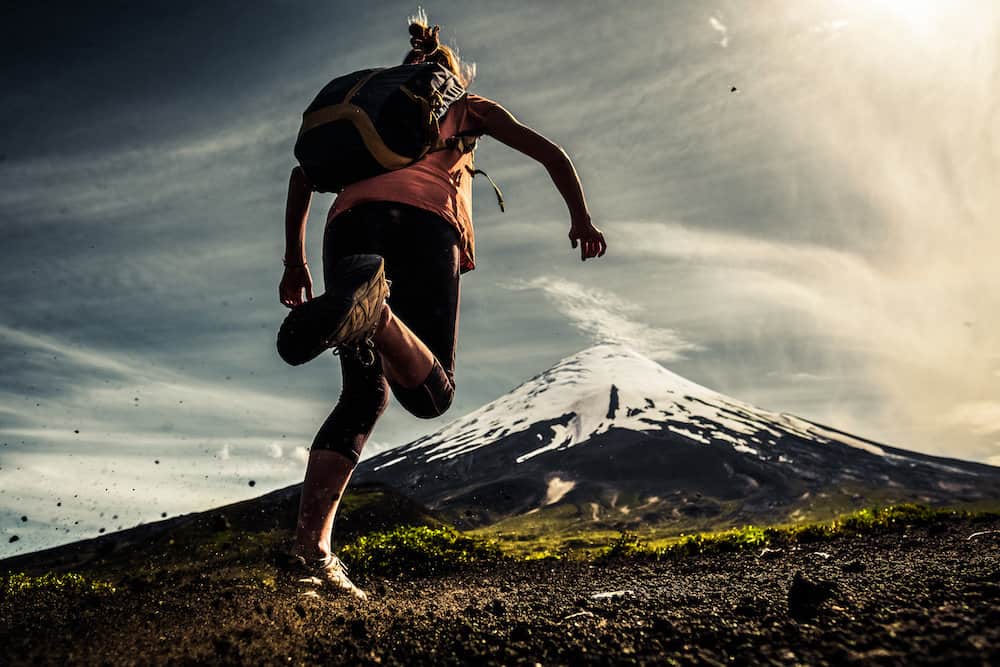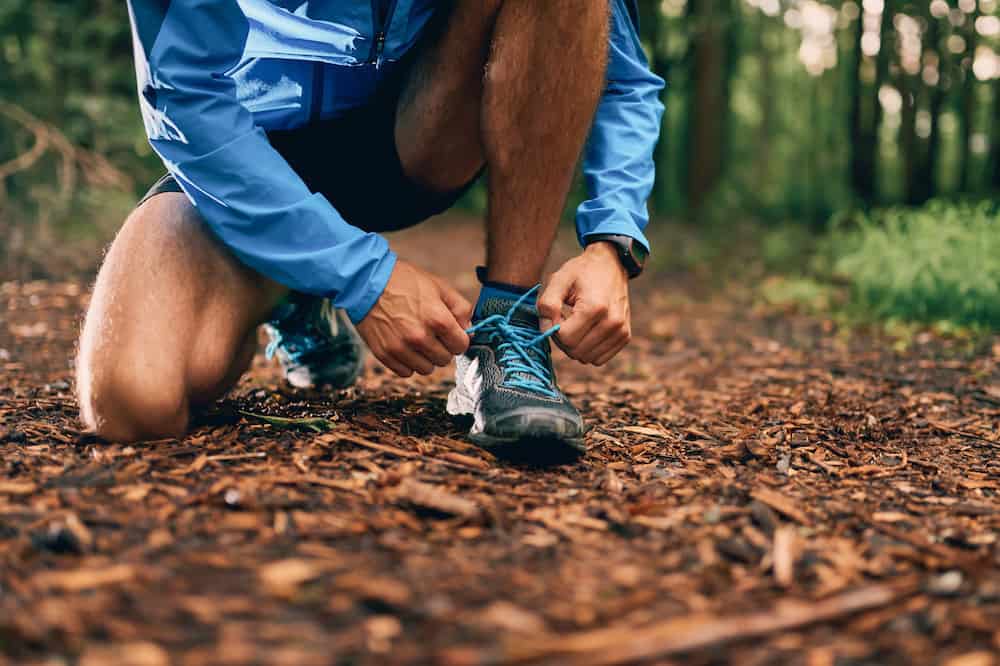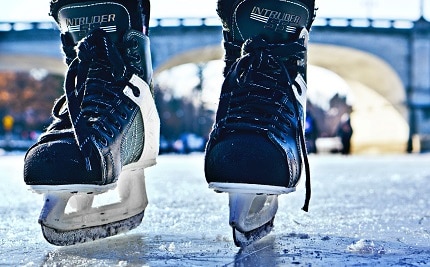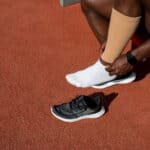Novice hikers and those looking for a lighter alternative to burly hiking boots might ask “Are trail running shoes good for hiking?”
The quick answer is yes; you can hike wearing a pair of trail runners. In fact, many hikers nowadays prefer these lightweight shoes over clunky boots.
However, before you make the switch, you must learn about the pros and cons of trail running shoes for hiking and when a pair of boots might be a better option.
What Are Trail Runners?
Trail runners are a style of footwear designed for off-road running.
These shoes are usually made from lighter materials that allow light and springy movement but offer more protection, support, and traction than road shoes.
Trail shoes also have stickier rubber outsoles designed to grip softer surfaces, which is especially helpful when trail running in the rain.
They also have deep, wide lugs for better grip on varying surfaces, from rocky trails to muddy terrain.
Are Trail Running Shoes Good for Hiking?
You may have heard that a good pair of hiking boots is essential to protecting your feet on the trail.
Yet, most long-distance thru-hikers and light backpackers switch to trail running shoes midway through their hike.
The difference between a trail runner and a hiking shoe isn’t always clear, and it gets cloudier these days with the introduction of hybrid models.
Take, for example, the popular runners like the Scarpa Rush and Salomon OUTline. These shoes build on a trail runner but feature stiffer, tackier soles and more protection in the uppers.
They certainly won’t be your first choice for trail running or backpacking. Still, the combination of support, breathability, and weight makes them ideal for fast and ultralight hiking.
Going back to your question, “Are trail running shoes good for hiking?”
Yes, it’s perfectly fine to wear these shoes on your hike, especially if you’re working on strength and stability.
Trail running shoes are ideal for hiking on established trails in warmer weather and when you’re not carrying a heavy backpack.
Even so, you may still prefer trail running shoes while carrying a heavy load as long as you don’t have past or existing injuries.

Trail Running Shoes vs. Hiking Shoes
To help you decide which type of shoe is best for your outdoor adventure goals, let us dig deeper into their similarities and differences.
There are a few areas to consider when deciding between trail running shoes and hiking shoes:
- Protection
- Support
- Weight
- Comfort
- Versatility
- Climate
- Durability
Protection
Unlike trail runners, which are more flexible, hiking shoes generally have a tougher construction featuring either leather or nylon.
They also tend to have generous toe caps, thick soles, and medium-stiff outsoles that help you navigate rugged terrain and protect yourself from roots, thorns, and sharp rocks.
For these reasons, hiking shoes make an excellent option when traversing poorly maintained trails or scrambling off trails.
Support
What sets hiking shoes apart from trail runners is the high ankles that offer support and prevent you from spraining or rolling your ankles.
With burlier outsoles and uppers, stiffer midsoles, and features like a toe cap and rubber rand, hiking shoes can provide ample support compared to trail running shoes.
Nevertheless, support can significantly vary within each category.
For example, some hiking shoes might be good for day hikes and short backpacking trips but lack the necessary support for heavier loads.
Meanwhile, you’ll find trail running kicks that perform well on various terrains and offer excellent cushioning and stiffness for a light, multi-day backpacking.
That said, it’s best to do your research and try on shoes before buying them to ensure that you’re getting enough support.
Weight
Since trail running shoes are made of light materials, they are much more lightweight and flexible than traditional hiking shoes.
For these reasons, many thru-hikers prefer to wear trail runners. The big advantage of lighter shoes is they allow you to be more nimble on your feet.
As you may have heard, one pound on your feet equals approximately six pounds on your back. Thus, taking a load off your feet helps you move faster and use less energy.
That makes a big difference when you’re dodging rocks, logs, and boulders.

Comfort
Since they are made of lighter, softer material, trail runners won’t feel as restrictive. They also offer much more flexibility, so you have better range and freedom of movement.
Meanwhile, hiking boots are made from thicker materials and don’t offer a lot of wiggle room. The snug fit is important to provide sufficient support around your ankles.
Thus, a trail running shoe is a better choice if you’re carrying light loads and moving quickly on a well-maintained trail.
It offers the best combination of flexibility, nimbleness, and cushion.
However, a stiff and supportive hiking shoe is the most comfortable choice if you’re carrying a heavy pack or traversing more technical ground.
Moreover, unlike hiking boots, trail running shoes require almost no breaking in.
Their flexible design makes them easier to move around in, so you can wear them straight out of the box.
This offers an advantage for hikers tackling a huge number of miles as they can easily change pairs if their shoes wear out.
Versatility
You’ll benefit from a pair of trail running shoes if you love breaking into a jog while tackling the hills and mountains.
This footwear is pretty versatile, so it’s great for hikers who like to mix up the pace.
Climate
If you’re hiking in warm weather, you will benefit from wearing trail runners, as they are usually made with mesh uppers for maximum breathability.
The lighter construction of the shoes also means they dry faster, so even if you work up a sweat, the moisture won’t stick around.
On the other hand, if you’re hiking in the autumn and winter months when the weather is colder, you’re better off with warm and rugged hiking boots.
Durability
Hiking boots, in general, are made with sturdy materials. Some models even have a waterproof exterior layer to protect your feet against the elements.
With proper care, hiking boots should last up to 1,000 miles of hiking.
Trail runners, on the other hand, will need to be replaced every 500 miles to prevent excessive wear that could damage your feet.

When to Use Trail Running Shoes
There are several instances when trail running shoes are a better option, including:
When You’re an Experienced Hiker
If you’re new to hiking, keeping yourself upright on trails while wearing a pack can be challenging. Hence, you need hiking shoes with wide, thick soles and a stable base.
However, if you’ve been hiking for a while now and developed the necessary skills to keep yourself upright on the trail, the lightness and comfort of trail running shoes will make your hike a lot more fun and comfortable.
When You Need to Hike Fast
If you’re off to a speedy hike, lightweight trail runners will make it easier to maintain a brisk pace. With your trusty pair of trail running shoes, you can knock off huge chunks of miles day after day.
If you’re wandering on a beautiful forest or a paved nature trail, a pair of trail running shoes can easily handle it.
However, you need beefier boots that can stand up to wear and tear for sketchy trails.
If you expect to hike in cold, wet conditions, you’d benefit from a pair of sturdy waterproof hiking boots, although you can also find waterproof trail running shoes.
When You’re Carrying a Lighter Pack
If you don’t plan to wear a significantly heavy load, you might find it more favorable to wear a pair of lightweight trail runners.
You can also wear them if you haven’t had any issues with strength and stability.
You Can Hike With Trail Running Shoes
To sum up, trail running shoes are good for hiking if you use them on well-maintained trails during warm weather.
They’re also an excellent option for fast hiking and when you’re carrying a lighter load.
However, if you plan to navigate a sketchy trail in a cold winter month, you need a pair of sturdier hiking shoes or boots that can provide you with sufficient support and protection.














I think with hiking shoes one should always have that extra inner and ankle support as it is so easy to twist an ankle when walking in rugged terrain. What I love about todays hiking shoes is that they are so much lighter and you also get more flexible options which makes such a difference, especially when going on long weekend hikes. I also love shoes with the wide thick soles which makes walking on rocks so much easier.
Hi, Michel Maling, and thank you.
Thank you for your kind words.
Yes, I agree. It has been incredible development in hiking shoes when you look back. I remember the time when they were heavy and not as easy to use as today.
Both hiking shoes and trail running shoes have their pros and cons. So it is much more today the question about where you are going and how fast or slow you want to go.
But we must always think first about the landscape. It is the key think about decisions. As you say, a lot of big stones etc, hiking shoes would be the best thing to use.
It is great to hear about the benefit of the article too!
Don’t hesitate to contact me to help you with anything else or if you have any questions.
Excellent article! I think the trail running shoes would be a good choice for me since I mostly walk fast on paved walkways. I’m more of a beginner at backpacking and hiking. I prefer the paths in some of the park areas around here with the paved walking trails.
Is the trail running shoe a sneaker or a shoe? Do you think this type of shoe would be a good choice for me?
Thanks, Carol
Hi, Carol Barnes, and thank you.
Thank you for your kind words.
Trail running shoes are sneakers. Because of that, it has pros and cons, but looking at what you tell me in the comments, I believe it will benefit you.
Because you talk about how fast you walk, which is excellent for trail running shoes, and you would benefit from trail running shoes in many circumstances.
But at the same time, you say that you are a beginner at hiking, so I would start first, when you are getting experience and training, with using hiking shoes. Special if it is a lot of stones etc., where you hike.
Here is an article with some tips about trail running shoes. You would find it interesting.
It is great to hear about the benefit of the article too!
Don’t hesitate to contact me to help you with anything else or if you have any questions.